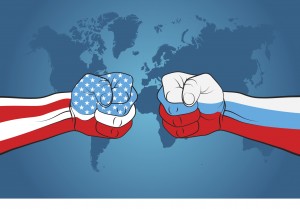
Edward Lozansky
Edward Lozansky is president of the American University in Moscow, Professor of Moscow Sate and National Research Nuclear Universities.
While politicians, political analysts, and the media hold lengthy debates about the potential onset of a new Cold War, the US Congress is already preparing the public for the possibility of a hot one.
That country has been no stranger to anti-Russian rhetoric these past few years, but that previously focused mainly on human-rights abuses and the stifling of the free press. Recent resolutions in the House of Representatives (HS Res. 758) and the Senate (S. 2277) however, show that the political atmosphere has grown much more heated. Almost every paragraph in these resolutions describes "Russian aggression” and how to combat it.
Resolution 758 lists 34 "violations” committed by the Putin regime. These include the invasion of Georgia and Ukraine, the downing of Malaysia Airlines Flight 17, an escalated campaign of propaganda, and the persecution of political opponents. Twenty-two countermeasures are suggested – from supplying lethal weapons to Ukraine and deploying missile-defense systems on Russia’s borders, to increasing funding for NATO, the Voice of America, and Radio Liberty. Naturally, support for the Russian opposition movement gets its own line item.
This resolution, which Ron Paul, the former Republican congressman and presidential candidate, has called "one of the worst pieces of legislation ever,” has already received the overwhelming approval of Congress. There were only ten votes against it, five from each party. Ron Paul and some other observers have called it a direct provocation of war with Russia. And it is true that never, even during the lowest point in American-Soviet relations or during the run-up to the wars in Afghanistan, Iraq, and Libya, has the rhetoric coming out of from Congress reached such a fever pitch of hostility toward that country and its leadership.
Although he phrases his ideas more bluntly, Ron Paul echoes the words of another former member of Congress, Democrat Dennis Kucinich, "NATO encirclement, the U.S.-backed coup in Ukraine, an attempt to use an agreement with the European Union to bring NATO into Ukraine at the Russian border, a U.S. nuclear first-strike policy, are all policies which attempt to substitute force for diplomacy.”
It should be noted that Resolution 758 is not binding, but it effectively presents President Obama with a blank check, or, as Kucinich calls it, a green light, to use military force against Russia. Therefore, it is important, at least for historical purposes, to note and preserve for posterity the names of these American "dissidents” in the US Congress – those few who are not blind to the potentially catastrophic consequences this resolution may entail. Here they are: Republicans Justin Amash, John Duncan, Walter Jones, Thomas Massie, and Dana Rohrabacher, plus Democrats Jim McDermott, Alan Grayson, Alcee Hastings, George Miller, and Beto O’Rourke.

Resolution 758 effectively presents President Obama with a blank check, or, as Kucinich calls it, a green light, to use military force against Russia.
An almost identical Senate resolution has already been approved by the Committee on Foreign Affairs, and there is no doubt that the vast majority of senators will vote in favor of it – it is even possible that vote will be unanimous, since no "dissidents” have yet stepped forward.
In this context it should be noted that perhaps never before has the American public held a lower opinion of their Congress than they do now. Only 8% of the population approves of the job they are doing, and there can be no question that the vast majority of Americans oppose the idea of war against Russia, despite the media’s unprecedented anti-Russian hysteria, in which the once-respectable New York Times and Washington Post are leading the charge.
American politicians are quite vulnerable to public opinion, so the Nobel Peace Laureate Barack Obama is unlikely to embark upon a debacle such as a war with Russia. Therefore, in addition to diplomacy, direct contacts, both personal and virtual, between citizens of Russia and the United States can have an exceptionally important part to play in this difficult situation. Public diplomacy is what is needed now, so that we can discuss political problems – in addition to narrowly defined professional issues – in order to broaden our understanding of what is happening in the world.




_jpg/250px-ElbeDay1945_(NARA_ww2-121).jpg)





